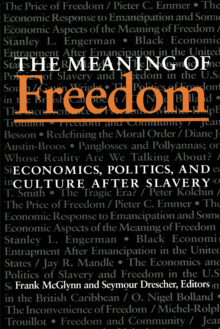

Seymour Drescher
Seymour Drescher is professor of history at the University of Pittsburgh. He is the author or editor of numerous books, including: Tocqueville and England; Tocqueville and Beaumont; and Econocide: British Slavery in the Era of Abolition.
The Meaning Of Freedom
Economics, Politics, and Culture after Slavery
In this interdisciplinary study, scholars consider the aftermath of slavery, focusing on Caribbean societies and the southern United States. What was the nature and impact of slave emancipation? Did the change in legal status conceal underlying continuities in American plantation societies? Was there a common postemancipation pattern of economic development? How did emancipation affect the politics and culture of race and class? This comparative study addresses precisely these types of questions as it makes a significant contribution to a new a growing field.

